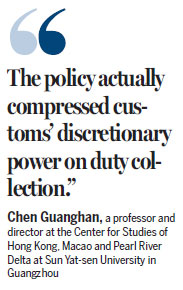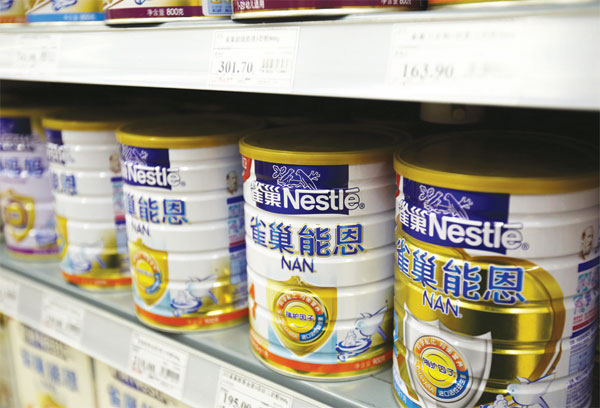Guangdong FTZ extends coverage of tax policies
Updated: 2015-07-01 08:52
By Chai Hua in Shenzhen(HK Edition)
|
|||||||||
New import tax policies for the Guangdong Free Trade Zone (FTZ) that expanded on Shanghai FTZ policy principles to a larger scale have been released.
Shenzhen Customs told China Daily that not only the Guangdong FTZ will adopted all preferential import tax policies of its counterpart in Shanghai, it will go one step further by extending the coverage to other areas in the city outside the FTZ. The details are still in discussion.
What's more, the Guangdong FTZ obtained the approval to implement the selective taxation policy. When products produced and manufactured by corporations located in the FTZ are sold inland, value added and consumption taxes will be collected. But the manufacturers can choose to be taxed by product materials or inspection conditions through applications.
Shenzhen Customs said this policy is not applicable in other areas so as to attract more companies to register in the FTZ area.
Besides Qianhai and Shekou in Shenzhen, the FTZ, which was officially launched in April, also includes Nansha in Guangzhou and Hengqin in Zhuhai.
The new policies also observe the principle that tax should be levied at the lowest end of the scale. For instance, if a product's duty ranges from 5 to 10 percent, the producer needs only to pay 5 percent according to the policy.
Chen Guanghan, a professor and director at the Center for Studies of Hong Kong, Macao and Pearl River Delta at Sun Yat-sen University in Guangzhou, said: "The policy actually compressed customs' discretionary power on duty collection."
He believes it is a practical policy for Hong Kong companies.
Meanwhile, to facilitate full implementation of these import policies, the FTZ will be allowed to set up tariff-free display trading platforms in the customs supervisory areas.
Shenzhen Customs explained that it is planning such a platform, but the location for it is not limited to the FTZ. Sha Tau Kok is one of the sites they are considering.
Sha Tau Kok, or Sha Tou Jiao in Mandarin, is a border area where Chung Ying Street is located. It was once famous for cross-border trading but has now become a distribution center for parallel trade.
The new platform would be an icing on the cake to the already booming cross-border e-commerce trading hub in Shenzhen, said industry experts.
In the first five months this year, Shenzhen Customs have examined and released above 2 million cross-border e-commerce personal lists with a value of more than 200 million yuan ($32.2 million). The total value is five times that of the annual value last year.
Many cross-border trading companies are focusing on opening bonded stores and "experience stores", which are welcomed by local residents.
In Nansha on May 1, more than 10,000 shoppers visited an experience store on its first day of opening.
Shoppers cannot actually buy the duty-free goods on display at these stores because they are only allowed to operate as bonded product exhibition centers.
Business service provider Tempus Group opened one such center in Qianhai, Shenzhen, exhibiting milk powder, diapers, cosmetics, food and wine.
Consumers can try out these products on site, but have to buy them online.
Prices of products in these bonded stores are the same as that in Hong Kong, some even cheaper.
For instance, the cost of buying milk powder of the same brand in Hong Kong is about HK$240 apiece (including transportation fees) and it only costs 170 yuan, or HK$212, in Tempus Group's store.
Wang Xiaoyue, the mother of a three-month-old baby in Shenzhen, said: "The cost is almost the same as Hong Kong if transportation costs are included and it saves me the trouble and time going through the check point."
She used to buy diapers and other baby products in Hong Kong, but now she can do that at bonded stores for the convenience.
grace@chinadailyhk.com

|
Prices of products in bonded stores in the newly established free trade zone are the same as those in Hong Kong, some even cheaper. Tomohiro Ohsumi / Bloomberg |
(HK Edition 07/01/2015 page9)
